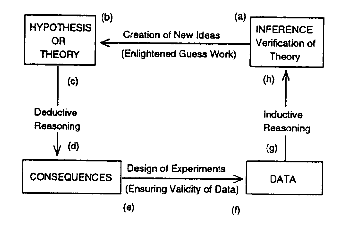Brown, N. J. L., & Heathers, J. A. J. (2017). The GRIM
Test: A
Simple Technique Detects Numerous Anomalies in the
Reporting of
Results in
Psychology.
Social Psychological and Personality Science,
8(4), 363–369.
https://doi.org/10.1177/1948550616673876
Button, K. S., Ioannidis, J. P., Mokrysz, C., Nosek, B. A., Flint, J., Robinson, E. S., & Munafo, M. R. (2013). Power failure: Why small sample size undermines the reliability of neuroscience. Nat Rev Neurosci, 14.
Chopik, W. J., Bremner, R. H., Defever, A. M., & Keller, V. N. (2018). How (and
Whether) to
Teach Undergraduates About the
Replication Crisis in
Psychological Science.
Teaching of Psychology,
45(2), 158–163.
https://doi.org/10.1177/0098628318762900
Frank, M. C., & Saxe, R. (2012). Teaching Replication.
Perspectives on Psychological Science,
7(6), 600–604.
https://doi.org/10.1177/1745691612460686
Gelman, A., & Loken, E. (2013). The garden of forking paths: Why multiple comparisons can be a problem, even when there is no “fishing expedition” or “p-hacking” and the research hypothesis was posited ahead of time. Department of Statistics, Columbia University.
Gilmore, R. O., Kennedy, J. L., & Adolph, K. E. (2018). Practical Solutions for Sharing Data and Materials From Psychological Research.
Advances in Methods and Practices in Psychological Science,
1(1), 121–130.
https://doi.org/10.1177/2515245917746500
Grahe, J. E., Reifman, A., Hermann, A. D., Walker, M., Oleson, K. C., Nario-Redmond, M., & Wiebe, R. P. (2012). Harnessing the Undiscovered Resource of Student Research Projects.
Perspectives on Psychological Science,
7(6), 605–607.
https://doi.org/10.1177/1745691612459057
Greenland, S., Senn, S. J., Rothman, K. J., Carlin, J. B., Poole, C., Goodman, S. N., & Altman, D. G. (2016). Statistical tests, P values, confidence intervals, and power: A guide to misinterpretations. European Journal of Epidemiology, 31(4), 337–350.
Haven, T. L., & Grootel, D. L. V. (2019). Preregistering qualitative research.
Accountability in Research,
26(3), 229–244.
https://doi.org/10.1080/08989621.2019.1580147
Hierarchy of evidence. (2023). Wikipedia.
Klein, R. A., Vianello, M., Hasselman, F., Adams, B. G., Reginald B. Adams, J., Alper, S., Aveyard, M., Axt, J. R., Babalola, M. T., Bahník, Š., Batra, R., Berkics, M., Bernstein, M. J., Berry, D. R., Bialobrzeska, O., Binan, E. D., Bocian, K., Brandt, M. J., Busching, R., … Nosek, B. A. (2018). Many Labs 2: Investigating Variation in Replicability Across Samples and Settings:
Advances in Methods and Practices in Psychological Science.
https://doi.org/10.1177/2515245918810225
Levenstein, M. C., & Lyle, J. A. (2018). Data: Sharing Is Caring.
Advances in Methods and Practices in Psychological Science,
1(1), 95–103.
https://doi.org/10.1177/2515245918758319
McCabe, A., Brenner, M., Larkin, P., Nic An Fhailí, S., Gannon, B., O’Sullivan, R., & Wakai, A. (2019). Capturing data for emergency department performance monitoring purposes. HRB Open Research, 2, 18.
Nosek, B. A., Ebersole, C. R., DeHaven, A. C., & Mellor, D. T. (2018). The preregistration revolution.
Proceedings of the National Academy of Sciences, 201708274.
https://doi.org/10.1073/pnas.1708274114
Rao, C. R. (1997). Statistics and truth: Putting chance to work (2nd ed). World Scientific.
Wagge, J. R., Brandt, M. J., Lazarevic, L. B., Legate, N., Christopherson, C., Wiggins, B., & Grahe, J. E. (2019). Publishing research with undergraduate students via replication work: The collaborative replications and education project.
Frontiers in Psychology,
10.
https://www.frontiersin.org/article/10.3389/fpsyg.2019.00247
Wilson, G., Bryan, J., Cranston, K., Kitzes, J., Nederbragt, L., & Teal, T. K. (2017). Good enough practices in scientific computing. PLOS Computational Biology, 13(6), e1005510.
Zwaan, R. A., Pecher, D., Paolacci, G., Bouwmeester, S., Verkoeijen, P., Dijkstra, K., & Zeelenberg, R. (2017). Participant
Nonnaiveté and the reproducibility of cognitive psychology.
Psychonomic Bulletin & Review, 1–5.
https://doi.org/10.3758/s13423-017-1348-y
